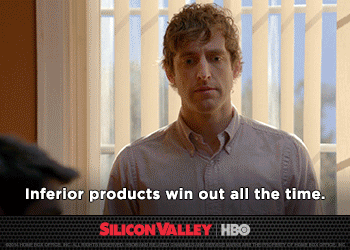The 20 Biggest Myths About Building a Business
There’s a lot of “conventional wisdom” about entrepreneurship that’s just plain wrong. Here are the worst offenders.
We still have a long way to go to get to where I’d call Groove a success.
But we’ve been working hard at this for a long time now, and one of the most valuable things that I’ve gotten from the experience so far is perspective.
I’ve learned a lot – we all have – and I look at business and entrepreneurship in a completely different way now than I did five years ago.
There were so many assumptions that I had that have been proven wrong that I’ve lost count, and even completely forgotten about most of them.
But these days, I’m very lucky to get many questions from founders looking for advice. And I’m reminded of just how many myths are floating around about growing a business. Myths that I believed, and that many (if not most) first-time founders still believe.
I’ve started a list below, and I hope you’ll help me add to it in the comments. Let’s shatter these myths together.
Check out the full list in this SlideShare, or read on for a more in-depth explanation of each one.
The 20 Biggest Myths About Building a Business from Groove
1) Founders Are Their Own Bosses
There’s a belief among many that the founder is the ultimate boss in any organization.

That couldn’t be further from the truth. The founder always answers to someone, whether it’s the board, the investors, or most importantly, the customers.
After all, founders don’t keep the lights on. Customers do.
Yes, you could technically choose not to do everything in your power to be great at your job, but just like any other employee, your boss – the customer – is eventually going to fire you.
2) The Founder Should Do Every Job in the Early Days
A lot of founders tell me that they don’t have enough time to invest hours into customer development or content marketing.
Yet they spend hours each week on things like scheduling, internet research and formatting investor decks. Even when you don’t have a lot of money, recognizing where you could be getting massively greater returns on your time – for example, spending an hour doing customer development versus spending an hour formatting a pitch deck – and then delegating or outsourcing the less important tasks is one of the biggest personal wins you can score.
3) Starting a Business Is the Best Way to Get Rich
More than once, I’ve heard founders tell me that their main motivation for starting a business is that it’s the only way to achieve “financial independence.”

Guess what. There are much more reliable and less risky ways to achieve financial independence than becoming an entrepreneur.
For example, by investing in yourself, learning a valuable skill (like coding), building a strong network, leveraging that network to land well-paid jobs and saving intelligently, you’ll be on a much more certain path to financial freedom than most entrepreneurs.
You can get rich in business, but it’s certainly not the easiest, or most guaranteed way.
4) Launching at an Industry Conference Will Set You Up for Success
I get worried when a founder tells me how excited they are to be launching at Conference X in a few weeks. They’ll use the buzz from that, they usually continue, to build their initial user base, and then it’ll only get better from there.
The reality is that this strategy almost never works. Conference launches are a vanity event; they make you feel nice, but rarely lead to real, long-term business results.
It’s amazing how many founders I’ve talked to who got a grand total of zero paying customers following their event launches.
And often, those who do get signups from the event end up with tire-kickers who don’t fit into their ideal customer profile anyway, and end up churning at best, and giving poor feedback and causing you to make misguided product changes at worst.
5) You Should Keep Your Product Secret Until It’s Ready
If your pitch starts with “but before I tell you, I just need you to sign this NDA,” you’re doing it wrong.
Ideas are the most hugely overvalued currency in the business world. We all have ideas, and my ideas, combined, haven’t made me a dime. The 99% of the equation that counts most is the tireless hustle and thoughtful execution that you need to make any idea succeed.

I’d rather have a first-rate execution and second-rate strategy any time than a brilliant idea and mediocre management.
Jamie Dimon, President and CEO of JPMorgan Chase
6) You Need to Take a Lot of Huge Risks
Entrepreneurship is often associated with risk, and I don’t really think that’s a helpful association, as it encourages first-time entrepreneurs to be more gung-ho with their decision making.
In fact, the entrepreneurs I know who win consistently are quite risk-averse.
They’ll make calculated bets and take smaller risks – this is what lean startups are built around – rather than swinging for the fences with any single business decision.
Taking smaller risks and hedging against loss helps you stay around for a lot longer… and gives you the time to place a lot more calculated bets.
7) Everyone Shares Your Problems
We’re all vulnerable to the false-consensus effect, in which we assume that others share the same beliefs that we do.
But just because we have a particular problem or viewpoint, doesn’t mean that our customers do.
In fact, realizing that very truth was one of my most eye-opening business lessons. When we first launched, we built that Groove that we wanted, not the one our customers wanted.
It took six long, expensive months to get back on track with our product development.
8) You Should Raise Money Whenever You Can
Just because money is on the table doesn’t mean you should take it.
If an investor offers to fund you, you should certainly consider it, but be careful. An offer like that can bend the way you look at your business goals and path to success, and the earlier you take in money, the sooner you’ll be expected to produce a return on that cash.
And sometimes, that pressure is what kills businesses in their infancy, before they’ve had a chance to understand their market and truly come up with a product that fits.
Plus, anytime you take funding, don’t forget another huge business myth:
9) Founder Dilution Isn’t a Problem
There’s an often-repeated sentiment among founders (especially first-time founders) that they’d “rather own a small piece of a huge pie than a huge piece of a small pie.”
I agree. But the chances of your pie growing big enough to make a small piece valuable are much lower than the chances of your entire pie growing big enough to make most (or all) of it valuable.
Be realistic about where your business might end up. Every time you dilute your ownership, you divest yourself from the success of the business, and in a world where you need to be fully committed to working your ass off for years before seeing results, that’s a dangerous and demoralizing place to be.
10) Spamming People on Social Media Is a Good Marketing Strategy

I’ve seen startups where someone – usually an intern – is given the full-time job of finding influencers on Twitter and Tweeting at them with a pitch to try the company’s product.
I’ve *never *seen this work. Not with that approach, anyway.
You get influencers’ attention by creating value for them, not by joining the hundreds of other startups looking for a handout.
11) You Need to Rent an Office

Another real quote:
Our first order of business is renting an office to work out of.
There are only a few things that a bootstrapped business needs in its earliest days, and an office isn’t one of them.
Work from home, coffee shops, coworking spaces… anywhere that doesn’t tie up thousands of dollars per month that would be better spent actually building your business.
And then, if you don’t want to go the remote route, invest in an office when you can comfortably handle the expense.
12) Your First Hires Should All Be Developers
If your team of 4-5 people is 100% developers (including the founder), you’re missing out.
Unless one of your developers is doing full-time customer development, and another one is doing full-time marketing (yes, even before your product has launched), and another one is doing customer support, then you’re missing some critical business functions that are far more important to your business than the incremental value of a third or fourth developer at that stage of your business.
13) It’s All About the Product
Another belief I’ve seen is that if you build a product that’s good enough, you’ll win.
But products don’t win. Businesses do.
And if you want to beat the competition, your product isn’t all that matters. You’ll also have to out-market them, out-support them and outperform them in many other ways.

14) If You Can Just Land That Huge Customer, You’ll Win
We spent a lot of time in our first few months chasing a huge potential account.
They wanted us to spend many hours building a custom solution for them, provide a full-time dedicated support resource and make other arrangements to make the product fit their needs.
And in the end, after reaching an agreement to get started, they walked away, leaving us with nothing but a huge setback in our development timeline.
I’ve heard similar stories from many founders, and ultimately, these deals, even when they go through, are not much more than a massive distraction, and banking your future success on them is a very dangerous move.
15) “Lines of Code” Is a Success Metric
This may sound obvious and lame to many of you, because it is.
But I’ve tragically heard it enough times that it needs to be included here. If any part of your pitch mentions how many lines of code you’ve written in order to make the large number seem like an accomplishment, you’re missing the point.
16) Your New Rockstar Developer Will Turn Your Company Around
Just two weeks ago, I heard from a founder who was pinning his hopes on the new ex-Apple developer that he just paid a boatload of cash to join his startup.
But just like everything else in a business, a single developer won’t make or break it. And even the best developer, without an extraordinary supporting cast and the marketing, support and strategy to get people successfully using your product will do you little good.
17) “We Can Worry About Money Later”
If you regularly read TechCrunch, you’ve certainly seen this sentiment.
We’re just focused on getting users now, we’ll figure out how to monetize later.
And that’s great. IF you’ve raised millions in venture funding and have years of runway.

But the same lesson doesn’t apply to bootstrapped startups. You can’t afford to aggressively court users with no idea how you’ll end up making money.
If you’re going to build a business, one of the first things you need to do is figure out how it’s actually going to be a business.
18) Everything Needs to Be Scaleable
Another concept that the startup world fetishizes is scalability.
If it won’t scale, we don’t do it.
After all, we’re planning to grow like crazy, so what’s the point of wasting time now on strategies that won’t work later?
But this misses an important point: the strategies that you need now are very different from the strategies you’ll need later.
If you haven’t reached product/market fit and don’t have enough paying users to see a clear roadmap to profitability, then you’re not ready to think about scale.
We still do a lot of things that don’t scale, and I don’t plan to stop for a long, long time.
19) More Features Will Improve Your Product
As we build our products, it’s easy to get stuck in the loop of thinking that the more great features we build, the more useful and attractive our product will be.
Unfortunately, the opposite is true a lot more often.
Features aren’t benefits. Many features deliver benefits, but no feature itself is a benefit. Ease of use, on the other hand, is a benefit. Every feature you add makes your product a bit less simple to use, so before adding any feature, think very carefully about whether you’re adding a benefit, or decreasing one.
20) You Can’t Afford Top Talent
Think you can’t hire top talent because you don’t have as much cash as Google and Facebook?
Think again.
There are so many elite developers, marketers and support agents out there, and not all of them are motivated solely by money.
Many want a different lifestyle than the one Facebook can provide. Many would rather work for a small, agile company, or one that allows them to work from home, or one that gives them a chance to own large parts of the decision-making process.
There are many benefits that you can offer that your wealthy competitors can’t, and those do matter.
What Are Other Big Business Myths?
This list is long, but it’s by no means exhaustive.
I’d love to add to it. What myths have you come up against? Let me know in the comments.